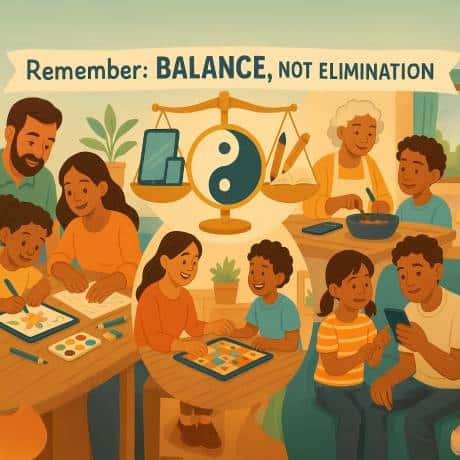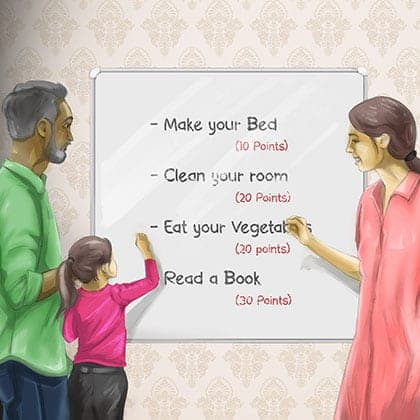
The Importance of Sleep for Children (Circadian Rhythm)

Sleep for children is no joke and is crucial as it supports their physical and mental growth and development. During sleep, the body can consolidate memories, repair and regenerate tissues, and produce hormones necessary for growth.
Additionally, adequate sleep helps regulate a child’s mood, attention, and learning abilities. The circadian rhythm is the body’s internal biological clock that regulates the sleep-wake cycle and helps ensure that a person gets enough sleep and is awake during the day. Disruptions to the circadian rhythm can lead to sleep disorders and negatively affect a child’s health and well-being.
Table of Contents
Benefits of Sleep for Children
Having your child get enough sleep is crucial for their growth and energy levels and brings a range of surprising benefits [8, 9]:
-
Brain Development:
Sleep plays a crucial role in brain development and helps consolidate memories, increase creativity, and support learning and academic performance.
-
Physical Growth:
Sleep supports physical growth and the repair of tissues, which is especially important for growing children.
-
Mental Health:
Adequate sleep helps regulate a child’s mood, reduce stress and anxiety, and improve overall well-being.
(Disclaimer: this is not designed as a treatment for individuals experiencing a mental health condition and should not be viewed as a substitute for professional advice, including, without limitation, medical advice.)
-
Improved Behavior:
Children who get enough sleep tend to have better behavior and social skills than those who don’t.
-
Better Concentration:
Sleep also helps children concentrate better, making it easier for them to focus on school and other activities.
-
Better Athletic Performance:
Sleep is also essential for athletic performance and helps improve coordination, reaction time, and endurance.
How Long Should Children Sleep
The amount of sleep that children need varies based on their age, but the following are the recommended guidelines [1,2]:
👩🦰👨🦱 Teenagers (13-18 years): 8-10 hours
It’s important to note that these are only general guidelines, and individual needs may vary. If your child is consistently experiencing sleep-related problems, it’s best to consult a pediatrician or sleep specialist.
Do Children need to take Naps?
As any parent knows, it’s normal for young kids to need a nap – even at mealtimes! Nothing beats that moment when you’re all gathered around the dinner table, and your toddler begins dozing off in their highchair. It can be an adorable sight… even if they are snoring just loud enough to rival Dad!
Napping can help improve mood, behaviour, and cognitive function, especially in younger children. Napping is also a natural part of a child’s sleep cycle and can help make up for any sleep deficit they may have accumulated.
However, as children get older, they generally need less daytime sleepiness and may transition to one longer nighttime sleep. The frequency and length of naps will vary depending on the child’s age and individual sleep needs. It’s essential to create a consistent sleep routine for children to ensure they get enough rest and support their growth and development [5,6].
Lack of Sleep: Cause & Effect
Lack of sleep can have negative effects on children’s health and development. Some children’s most common causes of poor sleep include inconsistent sleep schedules, exposure to screens before bedtime, stress, and certain medical conditions.
Here are some of the effects of lack of sleep in children [9, 10, 11]:
-
Impairment of Cognitive Function:
Lack of sleep can lead to decreased attention, memory, and learning ability.
-
Increased Risk of Obesity:
Chronic sleep deprivation has been linked to an increased risk of obesity in children.
-
Behavioral and Emotional Issues:
Children who don’t get enough sleep may have more mood swings, become irritable, and have difficulty with social interactions.
-
Poor Physical Health:
Lack of sleep can also lead to decreased immune function, increased risk of injury, and decreased athletic performance.
-
Increased Risk of Mental Health Disorders:
Chronic sleep deprivation has also been linked to an increased risk of depression, anxiety, and other mental health disorders [8].
(Disclaimer: this is not designed as a treatment for individuals experiencing a mental health condition and should not be viewed as a substitute for professional advice, including, without limitation, medical advice.)
It’s important for parents to ensure that children get enough sleep, maintain a consistent sleep schedule, and create a sleep-conducive environment to promote healthy sleep and prevent the negative effects of sleep deprivation.
Sleep Routine: Circadian Rhythm 101
The circadian rhythm is the body’s internal biological clock that regulates the sleep-wake cycle and helps ensure that a person gets enough sleep and is awake during the day. Understanding the circadian rhythm is important for children as it can help them establish healthy sleep habits and improve their overall well-being.
Here are some key points to help explain the circadian rhythm to children [3,5,6,7]:
- The circadian rhythm is what makes us feel awake during the day and sleepy at night.
- The circadian rhythm is controlled by a particular part of the brain and is influenced by light and darkness.
- It’s important to have a consistent sleep schedule and to get enough exposure to natural light during the day to help regulate the circadian rhythm (always be Sun Safe).
-
Technology and screens can disrupt the circadian rhythm and make it harder to fall asleep at night, so it’s important to limit screen time before bed.
- Engaging in relaxing bedtime routines, such as reading a book or taking a warm bath, can also help improve sleep and regulate the circadian rhythm.
- Children can develop healthy sleep habits and improve their physical and mental health by following a proper sleep routine.
(Disclaimer: this is not designed as a treatment for individuals experiencing a mental health condition and should not be viewed as a substitute for professional advice, including, without limitation, medical advice.)
The Importance of Sunlight
Sunlight is an essential factor in regulating the circadian rhythm in children, as it helps reset the body’s internal biological clock and promotes alertness and wakefulness [3,4].
Here are some key points on the importance of sunlight and the circadian rhythm for children and always be Sun Safe:
-
Sunlight helps regulate the production of melatonin, a hormone that regulates sleep.
- Exposure to natural light during the day helps reset the circadian rhythm and improve sleep quality at night.
- Sunlight exposure also helps boost mood and cognitive function, making it easier for children to concentrate and learn.
- Spending time outside and engaging in physical activity in the sunlight can also improve overall health and well-being.
-
Lack of exposure to natural light during the day can disrupt the circadian rhythm and lead to sleep problems, mood disorders, and other health issues.
- It’s important for children to get enough exposure to natural light during the day through activities such as spending time outdoors, playing sports, or even simply opening the curtains to help regulate the circadian rhythm and improve their physical and mental health.
(Disclaimer: this is not designed as a treatment for individuals experiencing a mental health condition and should not be viewed as a substitute for professional advice, including, without limitation, medical advice.)
How to Create Your Child’s Habit of Sleeping
Here are some tips for creating a healthy sleep habits for your child:
-
Establish a consistent sleep schedule: Set a regular bedtime and wake-up time for your child, even on weekends, to help regulate their sleep cycle.
-
Create a relaxing bedtime routine: Encourage your child to wind down before bed by reading a book, taking a warm bath, or listening to soothing music.
-
Limit screen time before bed:
The blue light emitted by screens can interfere with sleep, so it’s important to limit screen time to at least an hour before bedtime.
-
Make the sleep environment comfortable:
Ensure that your child’s bed and bedding are comfortable and conducive to sleep. Consider using blackout curtains or an eye mask to block out light and keep the room at a comfortable temperature.
-
Encourage physical activity:
Regular physical activity can help children sleep better at night. Encourage your child to be active during the day and to get enough exercise.
-
Be patient and persistent:
Creating a healthy sleep habit may take time, so be patient and persistent in helping your child establish a consistent sleep schedule.
By following these tips, you can help your child develop healthy sleep habits, improve their sleep quality, and get enough rest to support their overall health and well-being.
Frequently Asked Questions
What are the key signs of sleep deprivation?
Here are some common signs of sleep deprivation in children:
-
Fatigue and Tiredness:
Children who don’t get enough sleep may constantly be tired and have difficulty staying awake during the day.
-
Inattention and Impulsiveness:
Lack of sleep can lead to decreased attention and increased impulsiveness, making it difficult for children to concentrate and follow instructions.
-
Mood Changes:
Sleep-deprived Children may become more irritable, have more mood swings, and have trouble with social interactions.
-
Decreased Academic Performance:
Sleep deprivation can impact learning and memory, leading to decreased academic performance.
-
Poor Physical Health:
Lack of sleep can also lead to decreased immune function, making children more susceptible to illness, and decreased athletic performance.
-
Bedwetting:
Some children may experience bedwetting as a result of sleep deprivation.
-
Nightmares and Night Terrors:
Sleep deprivation can also increase the risk of sleep disturbances, such as nightmares and night terrors.
If you notice any of these symptoms in your child, it’s important to consult with a medical professional to determine the underlying cause and to develop a plan for improving their sleep. By ensuring that children get enough sleep, you can support their overall health and well-being.
How long does it usually take a child to fall asleep?
The time it takes for a child to fall asleep can vary depending on several factors, including age, sleep environment, and individual sleep patterns. However, it can take children between 10-30 minutes to fall asleep on average.
It’s also important to note that some children may fall asleep quickly, while others may take longer. Suppose your child is having difficulty falling asleep. In that case, it’s essential to assess their sleep environment and bedtime routine to identify potential factors contributing to their sleep problems. By addressing these issues and creating a sleep-conducive environment, you can help your child establish healthy sleep habits and improve their sleep quality.
What is a Sleep-Conducive Environment?
The sleep-conducive environment is a sleep environment that is conducive to sleep, promoting relaxation, comfort, and a healthy sleep pattern.
Here are some ways to create a sleep-conducive environment for children:
Room Temperature: Keep the room at a cool and comfortable temperature, between 60-67°F, to promote sleep.
-
Room Lighting:
Reduce or eliminate light in the room by using blackout curtains or an eye mask, and consider using a night light for younger children.
-
Bed and Bedding:
Ensure that the bed and bedding are comfortable and supportive, with a mattress and pillows that provide adequate support and comfort.
-
Room Noise:
Keep the room as quiet as possible, and consider using a white noise machine or earplugs to block out distracting sounds.
-
Room Ventilation:
Ensure that the room is well-ventilated, with fresh air circulating to promote sleep.
-
Eliminate Distractions:
Remove distractions from the room, such as electronic devices, toys, and books, to help your child relax and sleep.
Creating a sleep-conducive environment can help your child fall asleep faster, sleep more deeply, and wake up feeling refreshed and rejuvenated.
Why does my child keep waking up?
There can be several reasons why a child may be waking up during the night. Some common causes include:
-
Sleep Disorders:
Sleep disorders such as sleep apnea, restless leg syndrome, or periodic limb movement disorder can cause children to wake up during the night.
-
Stress or Anxiety:
Children may wake up during the night due to stress or anxiety. This can be related to school, friends, family, or other life events.
-
Medical Conditions:
Certain medical conditions, such as allergies, infections, or digestive problems, can cause children to wake up during the night.
-
Sleep Environment:
An uncomfortable sleep environment, including a noisy or bright room, can cause children to wake up during the night.
-
Stimulants:
Consuming caffeine or other stimulants close to bedtime can interfere with sleep and cause children to wake up during the night.
-
Nightmares or Night Terrors:
Children may also wake up during the night due to nightmares or night terrors, which can be caused by sleep deprivation, stress, or anxiety.
If your child is regularly waking up during the night, it’s important to consult with a healthcare provider to determine the underlying cause and to develop a plan for improving their sleep. By addressing any potential sleep disruptions, you can help your child establish healthy sleep habits and improve the quality of their sleep.
Author:
 |
Lionel Thomas Father, Gamer and Founder with a Passion for Health, AI, Environment and Gamification of Life. |
Author Tools:
- Grammarly (Spelling and Grammar)
- ChatGPT (Content Enhancements & Research)
- GSpeech (Audio by AI)
- Other Tools (AI)...
Artists:
- Roy Wibowo (Header)
- Lionel Thomas using MidJourney [AI Generated] (Header)
- Lionel Thomas using MidJourney [AI Generated] (Content)
References:
-
1. How Much Sleep Do Babies and Kids Need?
Sleep Foundation
https://www.sleepfoundation.org/children...
-
2. AAP endorses new recommendations on sleep times
American Academy of Pediatrics
https://publications.aap.org/aapnews/new...
-
3. Light and Sleep
Sleep Foundation
https://www.sleepfoundation.org/bedroom-...
-
5. What Are Biological Rhythms?
WebMD
https://www.webmd.com/a-to-z-guides/what...
-
6. Circadian Rhythms
National Institute of General Medical Sciences
https://nigms.nih.gov/education/fact-she...
-
7. Overview of circadian rhythms
National Library of Medicine
https://pubmed.ncbi.nlm.nih.gov/11584554...
-
8. Mental Health and Sleep
Sleep Foundation
https://www.sleepfoundation.org/mental-h...
-
9. Children and Sleep
Sleep Foundation
https://www.sleepfoundation.org/children...
-
10. Schools Start Too Early
Centers for Disease Control and Prevention
https://www.cdc.gov/sleep/features/schoo...
-
11. Effects of Sleep Deprivation and Sleep Deficiency
National Heart, Lung, and Blood Institue
https://www.nhlbi.nih.gov/health/sleep-d...








 Snacks
Snacks Water
Water Eye Sight
Eye Sight Hearing
Hearing






















 Screen Time
Screen Time Play Sports
Play Sports
